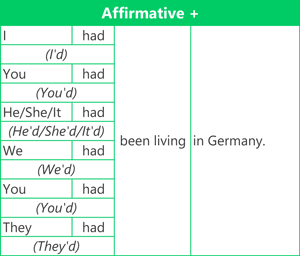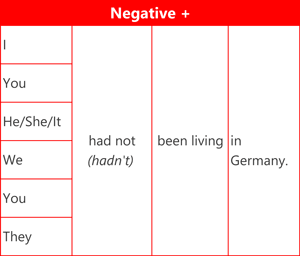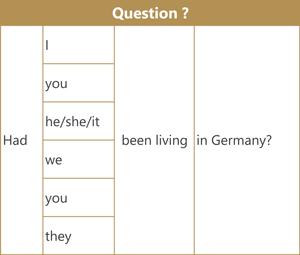What is the past perfect continuous?
The past perfect continuous is one of the English verb tenses.
You can learn more English online by visiting our free English grammar lessons, which include other verb tenses and more grammar points.
You can also find more grammar, vocabulary and communication tasks for each English level:
Use & examples |
The past perfect continuous tense connects links the past to the past and we use it to describe

(1) Period of time in the past before the past
[English level B1 - English level B2]
It describes temporary actions or situations that happened over a period of time before another time in the past. It is commonly used with the past simple.
- I'd been running (1) for two hours and I was (2) exhausted.
- I had been sleeping (1) when my wife arrived (2) back from work.
The past perfect continuous focuses more on the action itself.
The past perfect simple focuses more on the completion or the result than the action itself.
Form |
How do you write and pronounce the past perfect continuous?
Form: Key points
- Use the auxiliary verb 'had'+ been + main verb (-ing).
Here are examples of the affirmative (positive) form, negative form and question form using the verb 'live'.


Contractions
It is also possible to contract subject pronouns with auxiliary verb + 'not'
- I'd not
- He'd/She'd/It'd not

Short answers
- Yes, I had. / No, I hadn't.
- Yes, you had. / No, you hadn't.
Pronunciation
We commonly use contractions (e.g. 'I hadn't been going to the gym' or 'He hadn't been working') for the past perfect continuous tense, especially when speaking English.
Notes |
For the past perfect continuous, we have extra information about:
- spelling exceptions for verbs and
- time expressions that you can use.
Spelling exceptions for verbs
Sometimes we need to remove a letter, and other times we need to add another letter. Here are the exceptions:
1) One 'e' at the end of a verb
Remove the final 'e' and add 'ing'.
Examples:
[live] I'd been living in Germany.
[save] I hadn't been saving money for a new car.
* Verbs ending in 'ee'
These follow the normal rules.
Examples:
[see] He'd been seeing his friends.
2) Verb ends with consonant + one stressed vowel + one consonant
Double the final consonant and add 'ing'.
Examples:
[stop] I'd been stopping work early.
* Verbs ending with an unstressed vowel
These follow the normal rules, and the last consonant is not doubled.
Examples:
[develop] They'd been developing a new idea at the company.
3) Verb ends in 'l' (British English)
Double the final consonant and add 'ing'.
Examples:
[travel] I'd been travelling with friends.
4) Verb ends with 'ie'
Change 'ie' to 'y' and add 'ing'.
Examples:
[lie] She'd been lying to the teacher.
5) Verb ends with 'ic'
Add 'k' before -ing'.
Examples:
[panic] He'd been panicking about the exam.
Time expressions used with past perfect continuous
Time markers can be used with the past perfect continuous and connect (or relate to) two different times in the past.
1) for
This connects a period of time in the past to a later time in the past.
Examples:
I'd been working at this company for two years (when I got promoted).
2) when
This is used when something was happening at a specific time in the past.
Examples:
I'd been working this company for two years, when I got promoted.
Quizzes |
Quiz 1: Things that were happening before another time in the past
Things happening in the office just before the monthly meeting yesterday.
[Topic: Work]
Type the verbs in the past perfect continuous tense and use the affirmative, negative or question form.